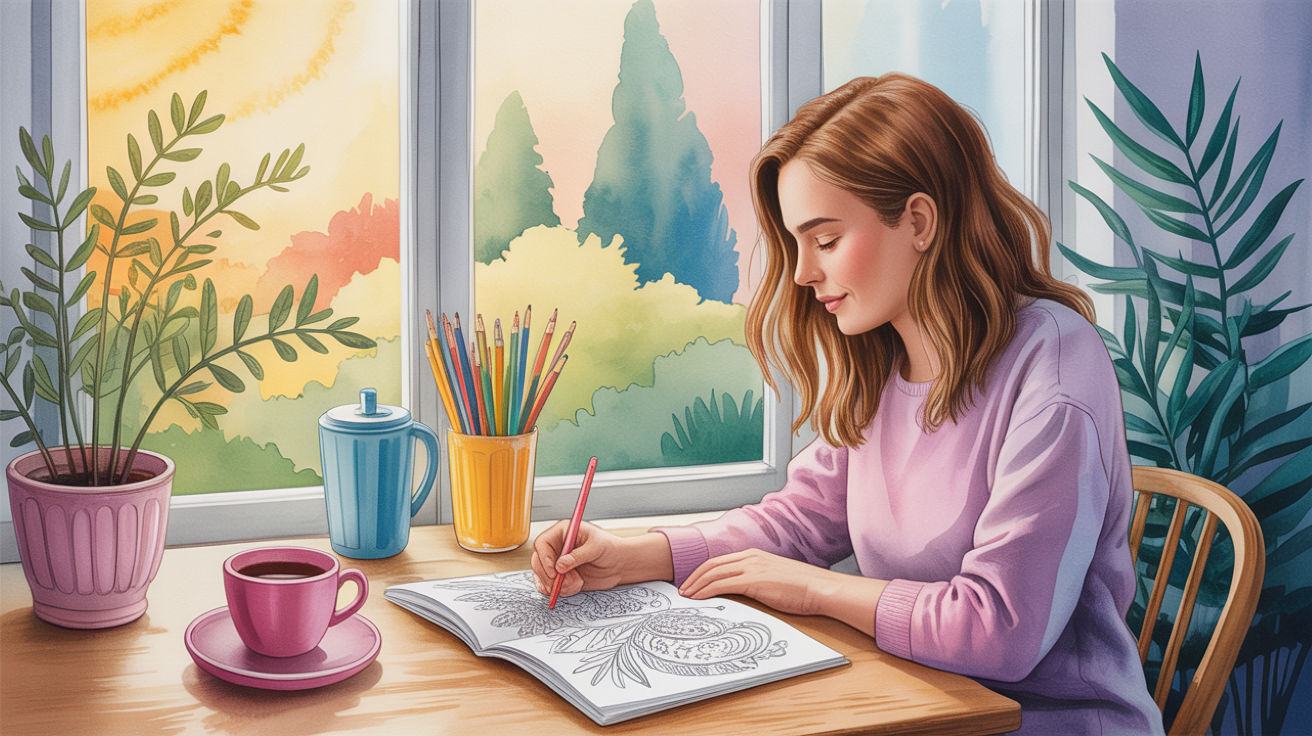
The way you begin your morning sets the tone for your entire day. While many reach for their phones or rush straight into their to-do lists, there's a gentler, more intentional way to wake up your mind and spirit. Creative mindfulness practices can transform your mornings from chaotic to calm, from reactive to responsive, and from stressed to centered.
Why Morning Mindfulness Matters
Research shows that the first hour of your day significantly impacts your mood, productivity, and stress levels for the next 23 hours. When we start our mornings mindfully, we activate the parasympathetic nervous system, which promotes relaxation and clear thinking. Adding a creative element to this practice engages both hemispheres of the brain, fostering balance and whole-brain thinking.
The Power of Creative Morning Practices
Creative activities in the morning serve as a bridge between the dream state and waking consciousness. They allow us to tap into our intuition before the logical mind takes over. Whether it's coloring, sketching, or journaling, these practices help us:
- Process emotions from dreams and the previous day
- Set intentions without pressure
- Activate neural pathways associated with problem-solving
- Reduce cortisol levels naturally
- Enhance focus for the day ahead
Building Your Creative Morning Ritual
1. The Gentle Wake-Up (5 minutes)
Instead of reaching for your phone, keep a small coloring book or journal on your nightstand. Before your feet hit the floor:
- Take three deep breaths
- Stretch gently in bed
- Open your creative tool of choice
- Spend just five minutes engaging with color or words
This simple act creates a buffer between sleep and the demands of the day.
2. The Mindful Cup (10 minutes)
As you prepare your morning beverage, bring your creative practice to the kitchen:
- While water boils or coffee brews, do a quick sketch
- Color a small mandala section
- Write three things you're grateful for
- Doodle your intentions for the day
The key is to stay present with the creative process rather than planning your day or checking messages.
3. The Morning Pages Practice (15-20 minutes)
Inspired by Julia Cameron's "The Artist's Way," morning pages involve writing three pages of stream-of-consciousness thoughts. But you can adapt this:
- Combine writing with simple drawings
- Use colored pens to express different emotions
- Create word-art with your thoughts
- Alternate between writing and coloring patterns
This practice clears mental clutter and often reveals insights you didn't know were there.
Choosing Your Creative Tool
Coloring for Calm
Adult coloring books are perfect for morning mindfulness because:
- They require no artistic skill or decision-making
- The repetitive motion is naturally meditative
- Color choices can reflect and influence mood
- Progress is visible and satisfying
Keep a dedicated morning coloring book with simpler patterns that don't require intense concentration.
Journaling for Clarity
A morning journal practice can include:
- Gratitude lists with decorative borders
- Intention setting with illustrated goals
- Dream recording with symbolic drawings
- Emotion tracking through color coding
The combination of words and visuals creates a richer, more memorable practice.
Sketching for Freedom
Free-form morning sketching might include:
- Abstract patterns that reflect your mood
- Simple nature drawings from your window
- Symbolic representations of your goals
- Continuous line drawings without lifting your pen
Remember, this isn't about creating art—it's about the process.
Creating Your Sacred Space
Designate a small area for your morning practice:
- A comfortable chair by a window
- Good natural or warm lighting
- Your creative tools within easy reach
- A small plant or meaningful object for inspiration
- A timer to maintain boundaries
This space becomes a sanctuary that your mind associates with peace and creativity.
Overcoming Common Obstacles
"I Don't Have Time"
Start with just five minutes. Even this small investment yields benefits. You can gradually extend the time as the habit forms.
"I'm Not Creative"
Creativity isn't about skill—it's about expression. Choose structured activities like coloring within lines or following journal prompts.
"My Mind Wanders"
This is normal and even beneficial. Let your mind wander while your hands create. This is when insights often emerge.
"I Feel Silly"
Remember that play and creativity are fundamental human needs. You're not being childish; you're being human.
The Science Behind the Practice
Studies have shown that creative mindfulness practices:
- Reduce cortisol levels by up to 68%
- Increase alpha brain waves associated with relaxation
- Improve focus and attention span throughout the day
- Enhance problem-solving abilities
- Boost mood and emotional regulation
When we engage in creative activities, we activate the default mode network in the brain, which is crucial for processing emotions and consolidating memories.
Making It Sustainable
To maintain your creative morning ritual:
- Start small: Five minutes is better than none
- Be consistent: Same time, same place daily
- Prepare the night before: Set out your materials
- Track your practice: Note how you feel after
- Be flexible: Adapt the practice to your needs
- Join a community: Share your morning creations online
The Ripple Effect
As you establish this practice, you'll likely notice:
- Increased patience throughout the day
- Better emotional regulation
- Enhanced creativity in problem-solving
- Improved relationships due to increased presence
- A greater sense of purpose and intention
- More restful sleep as your mind processes the day
Your Invitation to Begin
Tomorrow morning, instead of scrolling through news or emails, give yourself the gift of creative mindfulness. Pick up a coloring pencil, open a journal, or simply doodle while your coffee cools. Start with just five minutes of creative expression and notice how it colors the rest of your day.
Remember, this practice isn't about perfection or productivity—it's about presence and process. Each morning is a blank canvas, and you have the power to fill it with intention, creativity, and calm.
Begin tomorrow. Your future self will thank you.